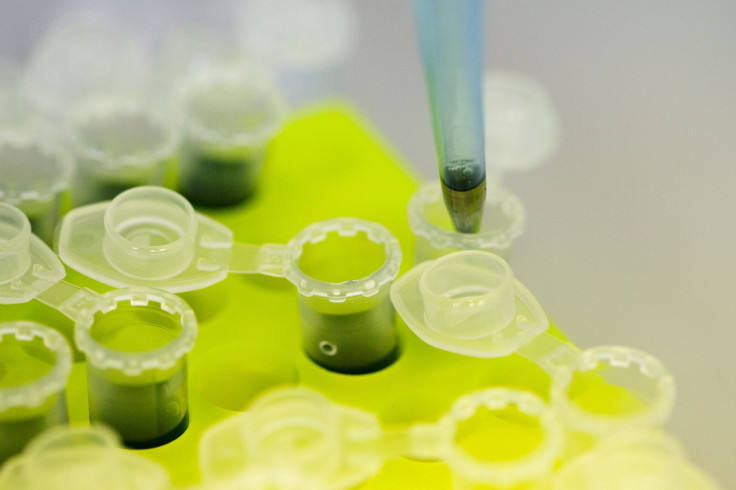Ebola Virus Vaccine: The Drugs That Will Help End The 2014 Ebola Outbreak

As Ebola spreads from West Africa to countries including Spain and the U.S., world health authorities are scrambling to find a way to put an end to the outbreak. There is currently no federally endorsed cure or vaccine for the disease, but two new candidate vaccines are being fast-tracked for approval by the U.S. government, and a number of drugs are in various stages of development.
At the same time, San Diego’s Mapp Biopharmaceutical Inc., the creator of the experimental Ebola drug ZMapp, has run out of test doses and its manufacturing partner, Kentucky BioProcessing, will not have more ready for months, as the drug’s approval by the U.S. Food and Drug Administration (FDA) has been held up for years. The new vaccines won't hit the market in the near future, according to World Health Organization spokesman Dan Epstein.
“Every vaccine that is put out has to pass national safety standards if it’s going to be used in the U.S.,” Epstein told International Business Times Wednesday. “That’s usually a two- or three-year process and we’re trying to compress that in terms of these two vaccines into several months. In that case, if they’re proven safe and proven to work, it’s possible that they may be able to be used by mid-2015 at the earliest.”
The candidate vaccines, called cAd3-ZEBOV and rVSV-ZEBOV, are expected to be whisked through the approval process in a way that Epstein said he does not believe has been done before for any vaccine. Recruiting patients for a vaccine trial, administering the vaccine and placebos, waiting for results and deciding whether or not to approve it generally takes about three years. But health authorities are working with the vaccines’ creators to help speed up the process in order to reap the potential benefits of bringing new treatments to market as soon as possible.
U.K.-based pharmaceutical giant GlaxoSmithKline collaborated with the U.S. National Institute of Allergy and Infectious Diseases to develop cAd3-Z, a candidate vaccine that relies on the insertion of an Ebola virus gene into a chimpanzee-derived adenovirus vector. The Public Health Agency of Canada in Winnipeg developed rVSV-ZEBOV, which is licensed for commercialization by NewLink Genetics of Ames, Iowa. It uses a weakened vesicular stomatitis virus (a livestock pathogen) with a gene replaced by an Ebola virus gene.
The vaccines, both in non-human primate testing for more than a year already, have shown promise in preventing infection when taken before exposure as well as stopping infection from taking hold when administered shortly after exposure. The vaccines are currently undergoing or will soon undergo a series of phase 1 trials in Africa, Europe and North America, according to WHO. The phase 1 trials will assess the safety of the vaccines, and they will need to be followed by monthslong phase 2 trials to assess their efficacy.
“Both companies are working to augment their manufacturing capacity. The goal is a very significant increase in scale during the first half of 2015,” WHO said in a statement, adding later, “Nothing must be allowed to slow down the goal of making vaccines accessible to people in affected West African countries.”
Unproven vaccines are not the only hope for slowing the metastasizing Ebola epidemic’s spread, as a number of experimental drugs are also being developed or awaiting approval.
ZMapp was portrayed in the media as a miracle drug of sorts after being administered to two Ebola patients in Atlanta who made a stunning turnaround to survive the virus. But now that the U.S. Centers for Disease Control and Prevention (CDC) has announced that stocks of ZMapp have been depleted, attention is turning to other experimental drugs.
“We’re following both pathways, actually,” Epstein said. “We want to look at every tool that we have to reduce the impact of this Ebola outbreak, so, yes, the drugs are another parallel pathway.”
The FDA on Monay approved the use of a drug called brincidofovir for use in treating Ebola patients. Created by the North Carolina biopharmaceutical company Chimerix Inc., the antiviral drug has been tested by the CDC and the National Institutes for Health after being fast-tracked by health authorities, The Hill reported. The FDA also approved a drug called TKM-Ebola for emergency use to fight Ebola. It's made by Vancouver’s Tekmira Pharmaceuticals Corp. and was given to an Ebola patient in Atlanta who went on to survive the virus. A number of other companies are working with the U.S. government to pursue Ebola drugs and vaccines.
The current Ebola outbreak started in March and quickly became the worst in world history, with its spread around the globe appearing to accelerate rather than slow. People have been being diagnosed with the virus in new locations like Dallas and Madrid in the past two weeks alone. The current Ebola outbreak had comprised 7,492 cases resulting in 3,439 deaths as of Oct. 3, the CDC reported.
© Copyright IBTimes 2024. All rights reserved.





















